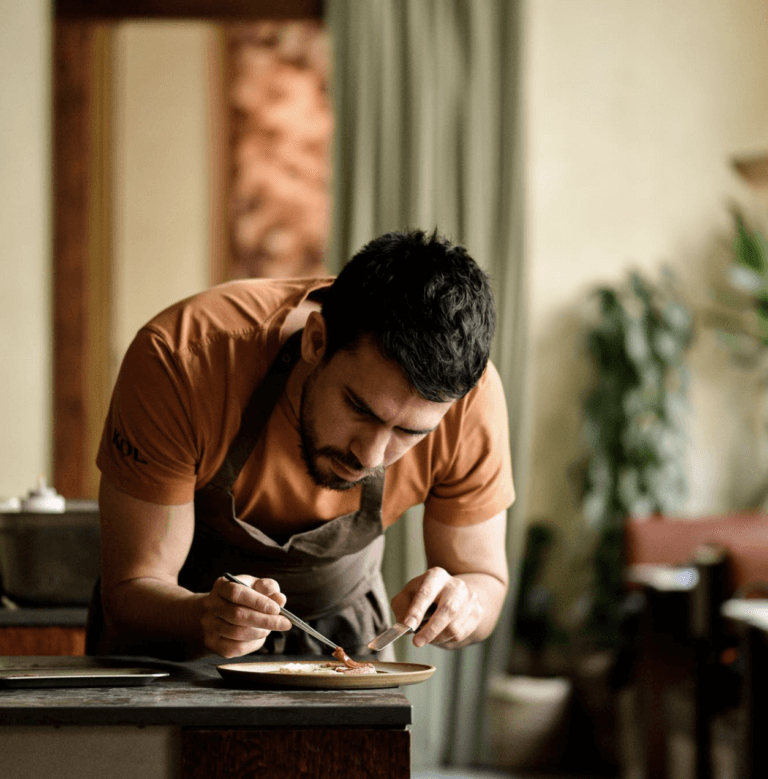According to recent restaurant industry statistics, three out of five new restaurants won’t survive a year, while four out of five will most likely fail in the next five years.
So what is the secret sauce?
What makes a restaurant truly successful?
We looked at 3 of the world’s best restaurants to understand their secret to success.
Why do restaurants fail?
The harsh truth of owning a restaurant cannot be denied. There are the long hours, finding and retaining top talent is a continuous challenge, and profitability is a constant struggle in a world of constantly fluctuating costs.
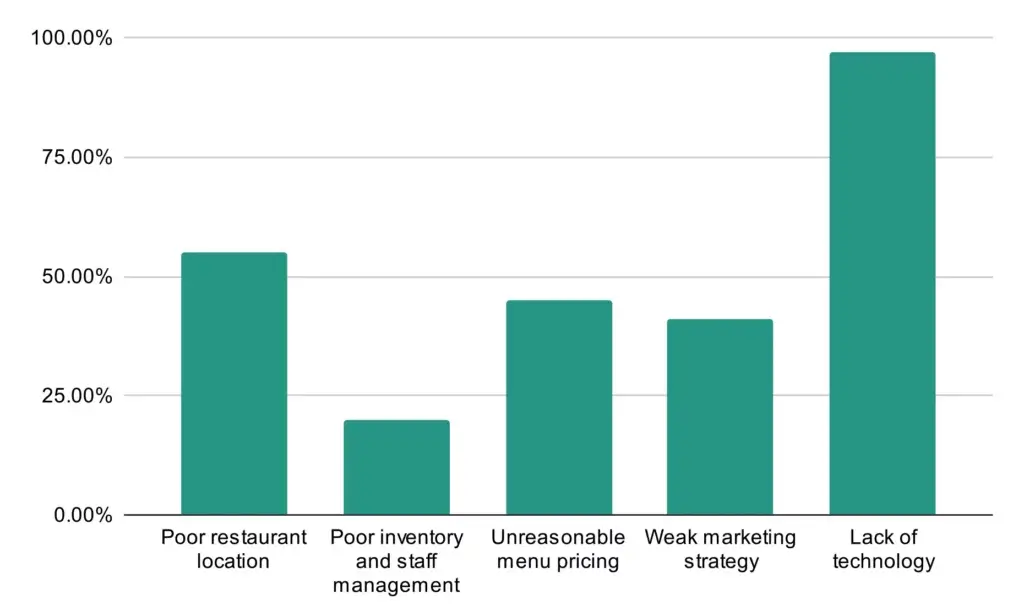
But there are common reasons why certain restaurants fail;
- Bad location
- Poor inventory and staff management
- Unreasonable menu pricing
- Weak marketing strategy
- Lack of technology
Also, consider things like inexperience in running a business. Often a chef will open a restaurant but they may not have the necessary experience in running a business and what that entails. They may have the secret sauce in terms of cuisine but running a restaurant is an entirely different matter.
Ultimately it’s process and systemization that are the ultimate cause of failure.

We know why restaurants fail, but how do they succeed?
What's the secret sauce to success from 3 of the world's best restaurants?
The World’s Best 50 Restaurants is a list produced by the UK media company William Reed, which originally appeared in the British magazine Restaurant in 2002.
We took a look at 3 listed in the Top 50 to see how they have continued to serve exemplary culinary experiences, delighting customers with their innovative creations and unwavering commitment to excellence.
1. "Commitment to Research" Kol, London 🇬🇧
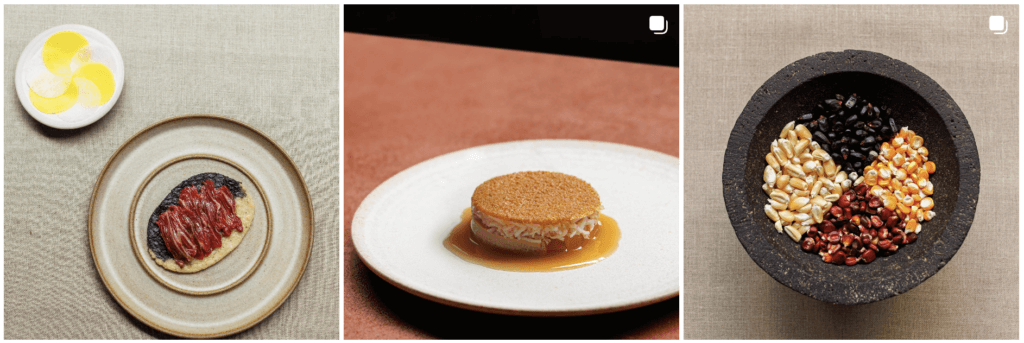
For Mexican chef Santiago Lastra, cooking has always gone hand in hand with research. The science, technology and history are as much a part of what’s on the plate as the ingredients, inspiration and technique.
Born in Mexico City, Santiago was raised just south of there in Cuernavaca, known locally as “The City of Eternal Spring.” The young Santiago wanted to be a mathematician rather than a chef, competing in Maths Olympic events more attracted to research and problem-solving.
This sense of curiosity inspired Santiago’s first attempt at cooking. Noticing a recipe for Crab Dip on the back of a packet of Ritz Crackers, he purchased the ingredients and prepared it for his family.
Then, aged 15, he started working part-time in a local Italian restaurant and by age 18 Santiago was offered an internship at Michelin-starred Europa Restaurante in Pamplona, Spain. He since studied at the Instituto Arte Culinario Coronado in Mexico and completed a Master’s Degree in Culinary Innovation at the Basque Culinary Centre.
“I loved how they think about recipes, the research, the development, the creative element…”
Kol was launched in 2020 with a vision to produce authentic Mexican food using predominantly British ingredients.
Santiago has created strong, bold menus that celebrate his homeland’s rich cultural tastes, aromas, and textures with meticulously sourced seasonal British produce. Part craftsman, part researcher, his cuisine is a contrast of elegance and balance that uniquely interprets Britain through a Mexican lens, melding the diverse landscapes and seas of both.
Tip to Takeaway 💡
Once you’ve found your concept that works, make sure you document it and train every member of your team to carry the concept throughout.
2. "You must evolve." Le Bernardin, New York 🇺🇸
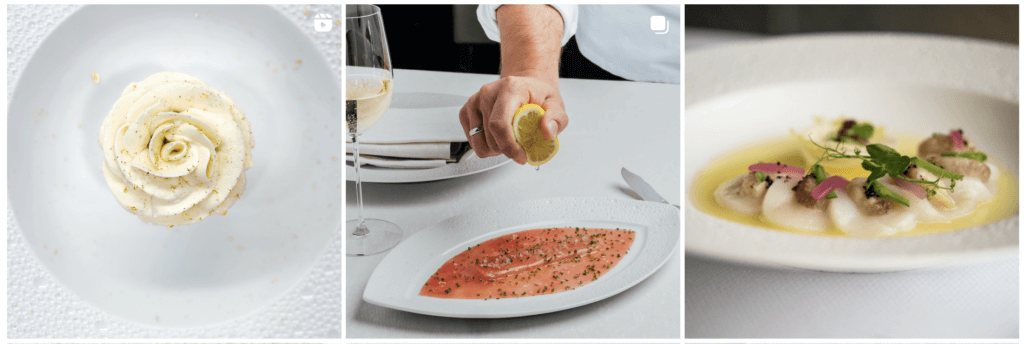
Established in Paris in 1972 by siblings Maguy and Gilbert Le Coze, Le Bernardin initially specialized solely in fresh fish, emphasizing freshness, simplicity, and culinary reverence.
Garnering its inaugural Michelin star in 1976, followed by two more in 1980, the Le Coze’s expanded to New York in 1986.
Following Gilbert’s untimely passing in 1994, Maguy Le Coze collaborated closely with Chef Eric Ripert, who assumed leadership of the kitchen, preserving the restaurant’s ethos of showcasing pristine seafood as the centerpiece of each dish.
Le Bernardin swiftly earned a coveted four-star rating from The New York Times within three months of its debut, a distinction it upheld through six consecutive reviews, solidifying its status as the sole establishment to maintain such acclaim over an extended period.

“You must always evolve. If the restaurant were still like it was the day we opened, it would be old! You must always change — but subtly.”
Maguy Le Coze, co-proprietor of Le Bernardin, hails from a quaint fishing village nestled in Brittany, France. Her grandfather was a fisherman, and her parents owned the Hotel de Rhuys, a small inn and restaurant.
So it’s no surprise that Maguy found herself immersed in the familial business while her brother Gilbert learned to cook in the kitchen.
In 1972, Maguy and Gilbert, still in their twenties, moved to Paris and opened a small restaurant named Le Bernardin after an order of monks devoted to good wine and food.
The restaurant’s meteoric rise prompted a relocation to larger premises in 1981, followed by the prestigious accolade of two Michelin stars a year later, cementing its status as a culinary institution.
Following her brother’s death, she and Chef Eric Ripert focused on the move to New York and have continuously strived to evolve whilst keeping the basis for success: the fish as the star of the plate.
Tip to Takeaway 💡
Adapt continuous improvement as a philosophy. One example would be to continuously optimize workflows.
3. "Detail, detail, detail", Hof van Cleve, Belgium 🇧🇪

Founded in 1987 Hof van Cleve is a renowned restaurant located in Kruishoutem, Belgium. It’s widely regarded as one of the finest dining establishments in the world, boasting three Michelin stars. Founder Chef Peter Goossens, known for his innovative and refined approach to Belgian cuisine, and his wife Lieve were the former driving force behind its success.
Situated in the idyllic landscape of the Flemish fields, Hof van Cleve has consistently earned top accolades and has become a destination for food enthusiasts seeking an exceptional gastronomic experience. The restaurant offers tasting menus showcasing seasonal ingredients sourced from local producers, ensuring the highest quality and freshness.
After years of being Peter Goossens’ trusted right-hand man, Chef Floris Van Der Veken takes over Hof van Cleve. He gained recognition for his work at The Jane, a renowned restaurant in Antwerp, Belgium, and now steps into a new chapter as head chef.
“Every detail, no matter how small, is approached with attention. For us, hospitality and service are as essential as an excellent dish.”
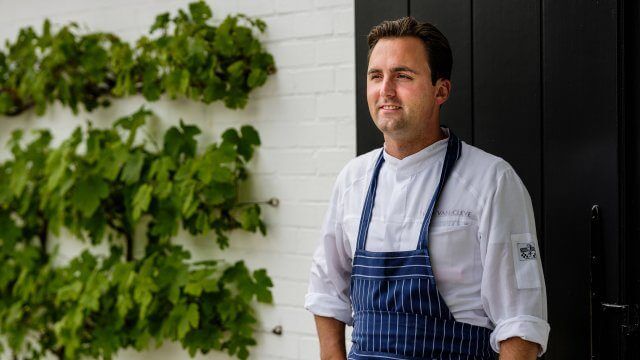
With love for the basic product, Floris strives to translate pure flavors in all their authenticity and subtlety into unique dishes. Complemented by an exceptional eye for detail and outstanding service, he promises unforgettable experiences for his guests.
Tip to Takeaway 💡
Details matter! Ensure that your processes are shared with everyone on your team and that each member of the team knows exactly what’s expected of them.
Process is the ultimate secret sauce
Successful restaurants are built on two key principles: they serve great food and work on streamlined and seamless processes and workflows.
As reported by Harvard Business School, a one-star increase in Yelp ratings can increase a food service establishment’s revenue by 9%!
That’s why restaurants put so much effort in Instagram worthy food shots but without the processes to back it up, such consist quality becomes impossible.
Processes in a restaurant are important to;
- Create consistency.
- Help your restaurant run— no matter who’s scheduled for work that day!
- Reduce food waste and boost profitability.
- Free up managers to more effectively manage staff.
- Reduce labor costs through easy cross-training.
- Ensure consistent and exceptional customer service.
How to enhance your restaurant processes?
- Identify and document the most important processes and workflows
- Analyze processes and identify key areas for improvement.
- Streamline front-of-house operations
- Enhance back-of-house processes
- Train staff and ensure ongoing training
- Review processes to ensure continuous improvement and feedback loops
Using a tool like Whale will help you do all of this systemically and in no time at all! Best of all you can share processes with your teams wherever they are with Whale’s mobile application.
What are the success factors for restaurants?
If the signs of a failing restaurant are increased turnover rate, absenteeism, poor food quality and reduced profitability, then what are the success factors?
We’re not in the restaurant business but the world’s best restaurants such as those listed above, have this in common;
- A Strong concept
- Seamless and strict processes that run to perfection
- Commitment to continuous improvement
- Hiring the world’s top talent
And obviously a world-class quality chef and food.
You don’t want to end up on Chef Gordan Ramsay’s Worst Nightmares. Instead, you want your customers to have the best culinary experience.
Bottom line?
There were 749,404 restaurants in the United States, as of 2023, making up 4% of the GDP.
The restaurant industry is the second-largest private-sector employer in the US, with over 15 million employees. (Menu Tiger).
As we conclude our culinary journey through the secrets behind the world’s best restaurants, it becomes clear that their success is not just about exquisite dishes or luxurious ambiance.
It’s about passion, innovation, and an unwavering commitment to excellence, not to mention the business processes that govern everything within the business from inventory management to training.
From sourcing the freshest ingredients to fostering a culture of respect and creativity among their teams, these dining establishments set the bar high. They remind us that the secret sauce to success in the culinary world—and perhaps in any field—lies in the dedication to craft and the continuous pursuit of perfection.



